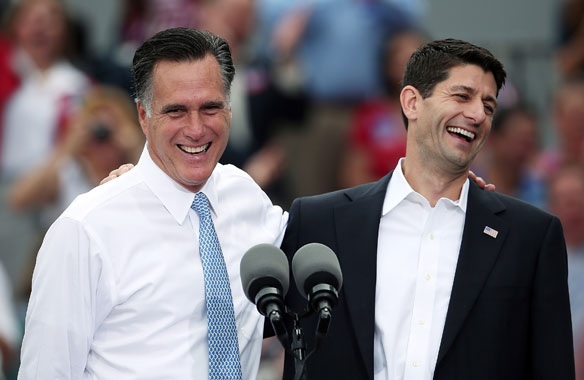
Congressman Paul Ryan’s economic views are at odds with more than 100 years of Catholic social teaching. It is no wonder that he’s had trouble arguing that his views are consistent with the teachings of his own church, including those issued directly from the Vatican. Yet this spring, in a speech at Georgetown University, Ryan insisted, “The work I do as a Catholic holding office conforms to the social doctrine as best I can make of it.” Very few voters expect their politicians to be theologically literate. Sadly, very few Catholics really know Catholic social teaching. But, the more interesting question, and the one that will bear on his ability to help recruit swing-voting Catholics for the GOP this autumn is this: Why does Ryan think he can make a Catholic argument for his ideas?
In Catholic intellectual circles—better to say pseudo-intellectual circles—several prominent Catholics have been arguing for the kinds of policies for which Ryan is now the poster boy. The Acton Institute’s Rev. Robert Sirico, the American Enterprise Institute’s Michael Novak, and papal biographer George Weigel have all asserted that traditional Catholic social teaching can be reconciled with the political interests of today’s GOP. They’ve done so, in part, by finding creative ways to baptize laissez-faire economics.
Of this group, Sirico is the most libertarian. Through his books, articles, and television appearances on the Global Catholic Network’s EWTN, Sirico has made a career out of confusing the “freedom” of the market with the “freedom” of the children of God, which St. Paul declared was the fruit of those who accept Christ’s salvific grace. Novak has been an apologist for corporate America since the 1970s. He once compared the modern corporation to the “Suffering Servant” in the book of Isaiah, and penned a lengthy essay in capitalistic agitprop entitled, “Toward a Theology of the Corporation.” But both Sirico and Novak operate at the fringes of popular Catholic consciousness.
Weigel, on the other hand, pens a column that is frequently syndicated to a variety of Catholic diocesan newspapers. He is probably best able to provide Ryan with theological cover, not least because Weigel himself has a long track record of dissenting from Catholic social thought. In 2009, Weigel wrote that Pope Benedict XVI’s encyclical on social justice, Caritas in Veritate, “resembles a duck-billed platypus:” to Weigel’s mind, an unnatural amalgam of the pope’s own views (particularly those on “life issues”) and those of his staff who promote “Justice and Peace.” Weigel went so far as to suggest that one reads the text with a red pen in hand, highlighting those passages Weigel thought were not really from the Pope.
Weigel’s hero, Pope John Paul II, wrote three social encyclicals. None of them cohere with the worldview of Ryan’s Catholic apologists. One has difficulty imagining Ryan or Weigel, or Novak or Sirico, agreeing with John Paul II’s 1981 endorsement, in Laborem Exercens, of “a principle that has always been taught by the Church: the principle of the priority of labor over capital.” Nor is it likely that they would agree with John Paul II’s explicit support for labor unions, developed out of what the Pope called the need for workers “to protect their just rights vis-a-vis the entrepreneurs and the owners of the means of production.”
Here, John Paul II wasn’t setting papal precedent. He instead drew on social teachings going all the way back to Pope Leo’s seminal 1891 encyclical, Rerum Novarum, which argued against both socialism and capitalism. In the 1930s, Pope Pius XI wrote of the “poisoned spring” of economic libertarianism in his encyclical, Quadragesimo Anno. Pope John XXIII’s Mater et Magistra, the Second Vatican Council’s Gaudium et Spes, and Pope Paul VI’s Populorum Progressio, all brought the issues of workers’ rights up to date for a twentieth-century economy. Nowhere in these encyclicals—not even in a footnote—will you find any suggestion that the Catholic Church supports the kind of Ayn Rand-inspired libertarianism espoused by Ryan and Sirico, and winked at by Novak and Weigel.
It is unclear to me whether or not these Catholic apologists for the GOP will give Ryan’s policies the cover he needs. Unlike Sen. Rick Santorum, who made social issues like abortion and same-sex marriage his calling card for many Catholic (and evangelical) voters, Ryan rose to prominence on the strength of these economic views that are clearly at odds with the Church. Already, it has been heartening to watch Ryan’s fetish for Ayn Rand become his Saul Alinsky: a radical association that causes people to question the intellectual heft and judgment of the candidate to whom the radical is tied. But Weigel and company have been working to force (think round peg, square whole) their economic views into compliance with Catholic social teachings for some time, and their influence has a long reach.
Still, one suspects these GOP Catholics mostly preach to the GOP choir. The real Catholic swing voter is more likely to listen to the counsel found in the Gospel of St. Matthew: “Whatever you do for these the least of my brethren, you do for me.” And, on that score, Ryan is a tough sell.
